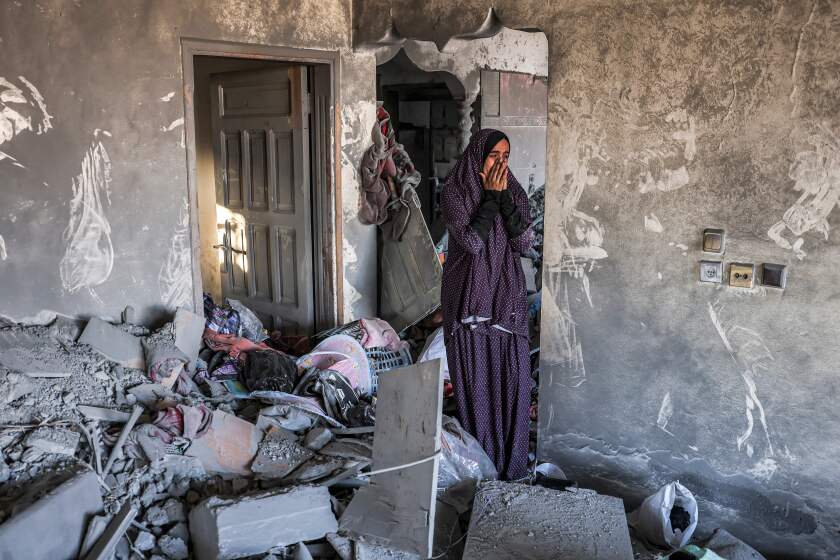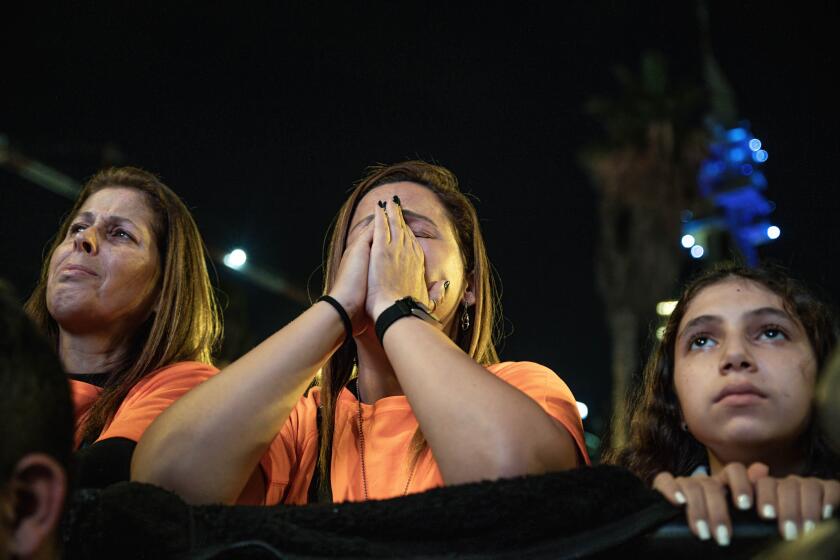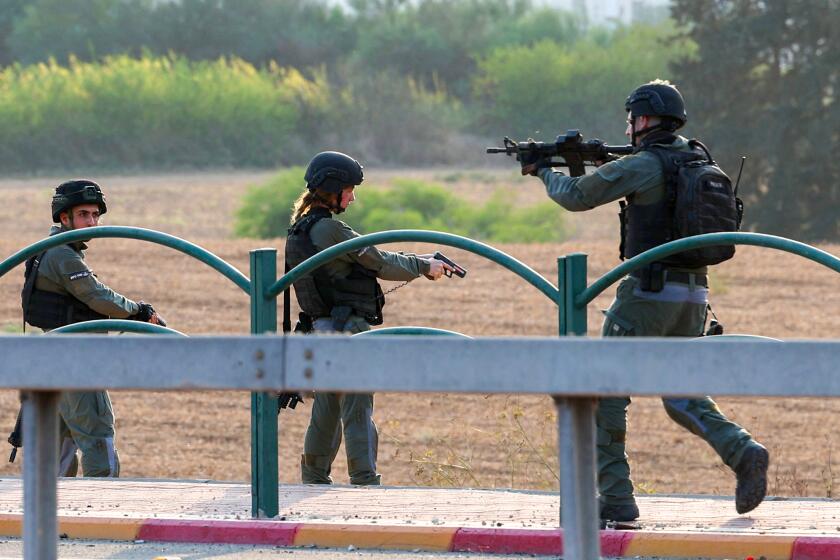
- Share via
The principle of “never again” is built into the very foundations of German national identity. The reasons should be obvious. German disavowal of its past through commemoration has become something of a gold standard for countries that have perpetrated unforgivable crimes. And yet, since Oct. 7, Holocaust memory has increasingly been invoked in Germany to suppress debate on Hamas militants’ massacres of that day in Israel and the brutalities the Israel Defense Forces have meted out against Gaza Strip civilians in the aftermath. It appears that something has gone terribly awry in Germany’s famed “culture of memory.”
In Germany, it has become virtually impossible to stand against the IDF’s violent targeting of Gazan civilians without being smeared with suspicions of antisemitism. The German-based Heinrich Böll Foundation reportedly withdrew its support from co-sponsoring the Hannah Arendt Prize for political thought to journalist Masha Gessen because of an essay they wrote this month in the New Yorker, in which they drew parallels between Gaza and a Jewish ghetto.
While this started before Oct. 7, what has been remarkable in the present crackdown is the inordinate number of Jews and Israelis in Germany now under attack for speaking out against the killing of civilians in Gaza. Even more disturbing is how many of them are being framed as antisemitic by German authorities, who similarly censure Arab and Middle Eastern communities who critique Israel.
Imagining possible futures beyond Israel’s Jewish supremacy is a political act for me, rooted in my people’s history.
At stake here is not only the German process of reckoning with its own past, but also the very fate of “never again” as an orientation around which we can make common cause against ongoing atrocity.
Germany’s memory culture rests on a basic conviction: that our ancestors are supposed to keep us honest in both their virtues and their sins, in how they lived, died, killed, were killed, took and were taken from. It is based on a conviction that public memory includes reckoning with both the unrepented crimes and the unredeemed injuries of our ancestors, and asks us to place these concerns at the center of our ethical imagination as we address not just the past, but also the present.
Global research on war, trauma and mental health shows there’s a risk of retribution and a cycle of violence. But support and interventions can help.
German law thus forbids denial of the Holocaust. The country also criminalizes expressing racist and antisemitic hate speech as well as denying war crimes and genocide. Many in the international community have come to admire Germany’s willingness to look inward for the enduring legacies of national crimes. And they would even like to see “never again” expanded into an ethic that could be applied anywhere, rather than limited to a national or ethnic scope.
In Germany, however, the promise of “never again” has contracted. Too often, German authorities now surveil newly arrived immigrants — out of fear that they might “import” antisemitism into the country — as well as the growing number of Jews who insist on their right not to see atrocities committed in their name. In Germany, Jews and Arabs are again placed under a special scrutiny.
In its two-tiered legal structure, strict movement controls and discriminatory land policies against Palestinians, the Israeli government has built a system that even some former Israeli officials describe as total apartheid.
Over the last two years, for instance, demonstrations commemorating the anniversary of the Nakba, when Palestinians were displaced and Israel was created in 1948, have largely been outlawed. Of those who defied this ban, many were members of Juedische Stimme, or “Jewish Voice,” a group of Jewish activists expressing solidarity with Palestinians. In last year’s Nakba demonstration, the majority of those arrested were Jewish members of the group.
Since then, things have only escalated. A leading member of Juedische Stimme who was born and raised in Israel was recently detained for a solitary protest in which she held a sign in a Berlin public square that read: “As a Jew and Israeli: Stop the genocide in Gaza.” We can question the value of the term the protester used on her sign to describe what’s happening in Gaza, but it’s a debate we need to have.
This is the last colonial war in the modern age, fought to establish the hegemony and the absolute rights of one people over the other.
Meanwhile, an award ceremony at the Frankfurt Book Fair honoring Palestinian novelist Adania Shibli was canceled by organizers in October. Her novel “Minor Detail” explores a historical murder of a Bedouin Palestinian girl by Israeli soldiers, a topic considered too incendiary.
A few weeks later, the Federal Agency for Civic Education canceled a symposium titled “We Still Need to Talk,” which had been planned for early December. The event was intended to start a conversation about how the paradigm of Holocaust memory could create a space for reflection and solidarity embracing commonalities and differences between the Shoah and other events of historical trauma (colonial genocides, the legacy of American slavery, for instance). In a statement, the organizers, who included Michael Rothberg, chair in Holocaust studies at UCLA, and Candice Breitz, a Berlin-based artist whose work grapples with global geographies of race, opposed the decision to call off the event.
Consider what we are seeing in these events. German police are arresting Jews for political expression criticizing the state of Israel, all in the name of combating antisemitism, while the German descendants of perpetrators (virtually all of us are) are declaring a proprietary expertise, accusing Jews and Arabs alike of not understanding the political purchase of antisemitism in our present.
Out of a laudable conviction that we, as German descendants of perpetrators (sometimes victims), have a special responsibility when we see violence meted out against the defenseless has emerged a proprietary relationship to the aspiration of “never again.” From subjecting the legacies of their own perpetration to scrutiny, German political institutions are increasingly directing scrutiny at others, framing antisemitism as a problem to be called out in others. If the optics here do not inspire a deep sense of unease, perhaps it is we who have not grasped the basic lessons of German history.
I have spent much of my scholarly career working in countries where the naming of ethnic cleansing, apartheid and genocide are fiercely debated as political violence rolls on unchecked. I am no stranger to the fact that, as the often-abused turn of phrase goes, “it’s complicated.” But the current situation in Germany makes a few things painfully clear. Public memory — the way pasts are kept as common parts of our shared social fabric — is a critical resource without which the very idea of a shared humanity is inconceivable.
Public memory, as such, can never be owned. The profound intergenerational grief that comes in the wake of historical traumas is a painful legacy, but a conversation about the contemporary meaning of that legacy cannot be avoided if “never again” is to remain a political ethic responsive to our present. We need to keep having this conversation, lest we resign ourselves to a world in which “never again” will always only mean “never again, next time.”
Manuel Schwab is a professor of anthropology at the American University in Cairo who lives and works part time in Berlin.
More to Read
A cure for the common opinion
Get thought-provoking perspectives with our weekly newsletter.
You may occasionally receive promotional content from the Los Angeles Times.













